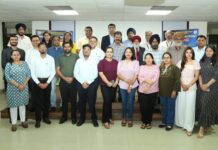Environmental and Social Impact Assessment (ESIA) evaluates potential environmental and social effects of projects. It ensure sustainable development by identifying and mitigating adverse impacts, promoting positive outcomes, and fostering stakeholder engagement, ultimately ensuring sustainable development and responsible project implementation. In this context, the Department of Sociology, School of Liberal and Creative Arts (Social Sciences and Languages) in collaboration with the Human Resource Development Center (HRDC) conducted a Short Term Course on Environmental and Social Impact Assessment w.e.f April 23, 2024 to April 29, 2024.
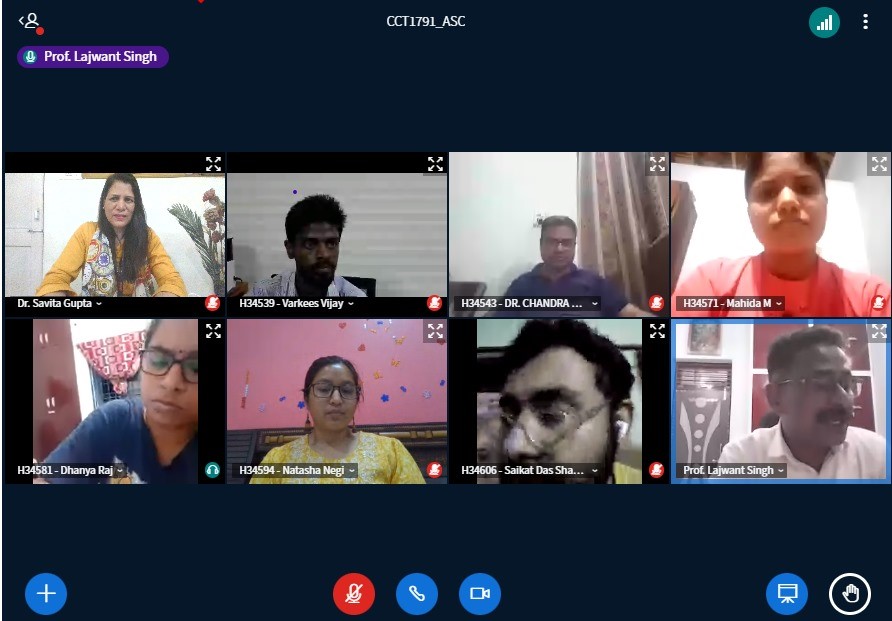
The course aimed at enhancing the understanding of legal frameworks, regulations and impact assessment guidelines, process of identifying, predicting and mitigating adverse impacts on the environment and society, evaluating the potential effects of development projects on the environment and local communities, addressing the need for social impact assessment for the holistic development of society and analyze the role of participatory rural appraisal methods for understanding social impact assessment.
Dr. Sunaina Ahuja, Professor and Dean, Head-Human Resource Development Center (HRDC), LPU the convener of the program, warmly welcomed the participants and mentioned that Environmental and Social Impact Assessment (ESIA) plays a crucial role in modern development projects. It evaluates potential environmental and social ramifications, aiding in informed decision-making and sustainable development. Moreover, she expressed confidence in the course’s deliberations and experiential learning activities that can help participants to develop tangible skills in Environmental and Social Impact Assessment (ESIA).
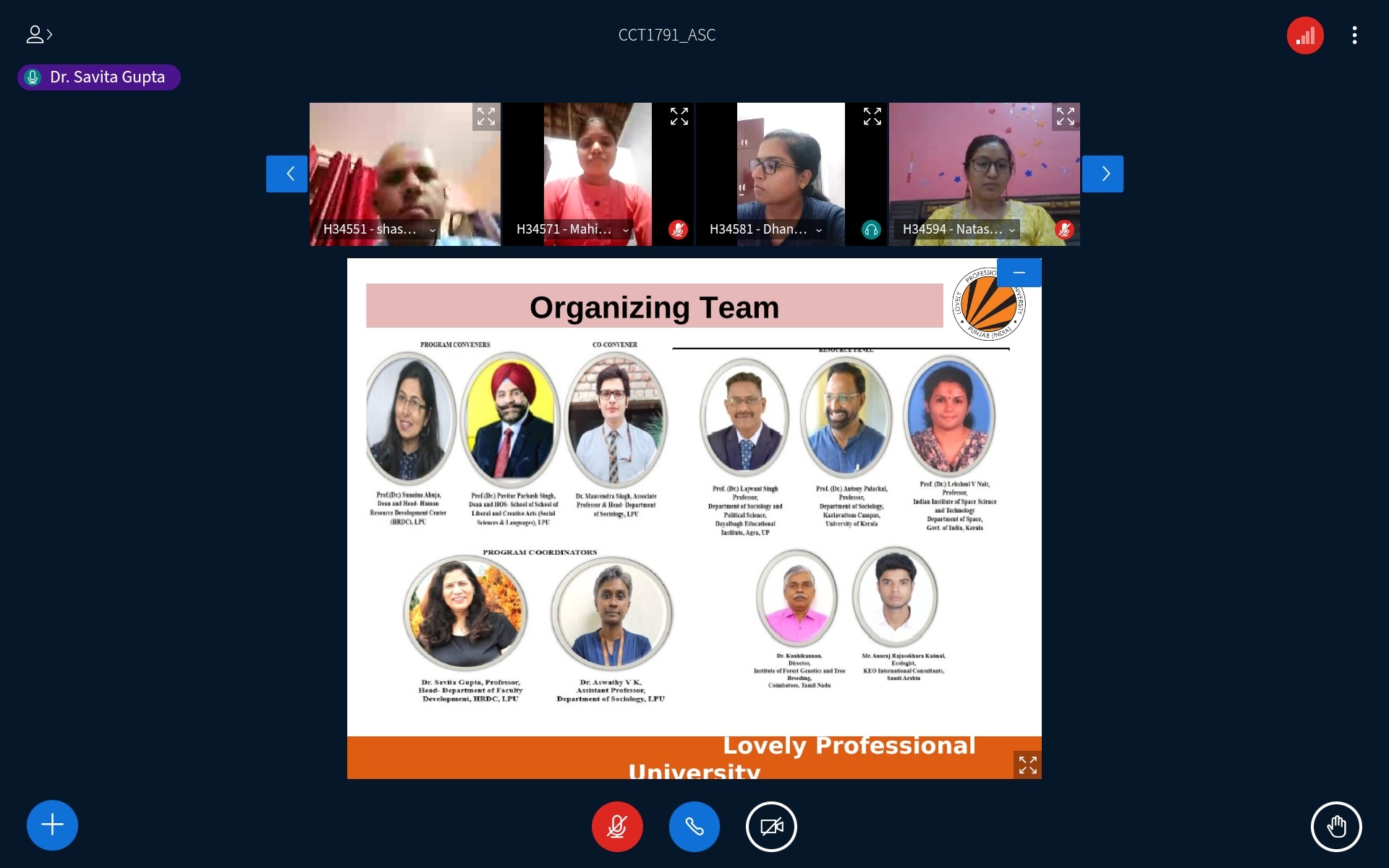
Dr. Manvendra Singh, Associate Professor, Head-Department of Sociology, School of Liberal and Creative Arts (Social Sciences & Languages), LPU, co-convener of the program, gave an overview of the course curriculum, elucidating its core objectives and significance in advancing knowledge and research in the fields of Environmental and Social Impact Assessment. He mentioned that ESIA fosters stakeholder engagement and transparency, facilitating dialogue between project developers, communities and environmental advocates. By identifying potential risks and mitigating measures upfront, ESIA minimizes adverse impacts on ecosystems and communities, fostering long term environmental sustainability and social well-being.
The resource panel included Prof. Lekshmi V Nair, Professor, Indian Institute of Space Science and Technology, Department of Space, Kerala, Dr. Kunhikannan, Director, Institute of Forest Genetics and Tree Breeding, Coimbatore, Tamil Nadu, Prof. Lajwant Singh, Professor, Department of Sociology and Political Science, Dayalbagh Educational Institute (Deemed to be University), Agra, UP, Prof. Antony Palackal, Professor, Department of Sociology, Kariavattom Campus, University of Kerala and Mr. Anuraj Rajasekhara Kaimal, Ecologist, KEO International Consultants, Saudi Arabia. Day wise key highlights of the program are appended below:
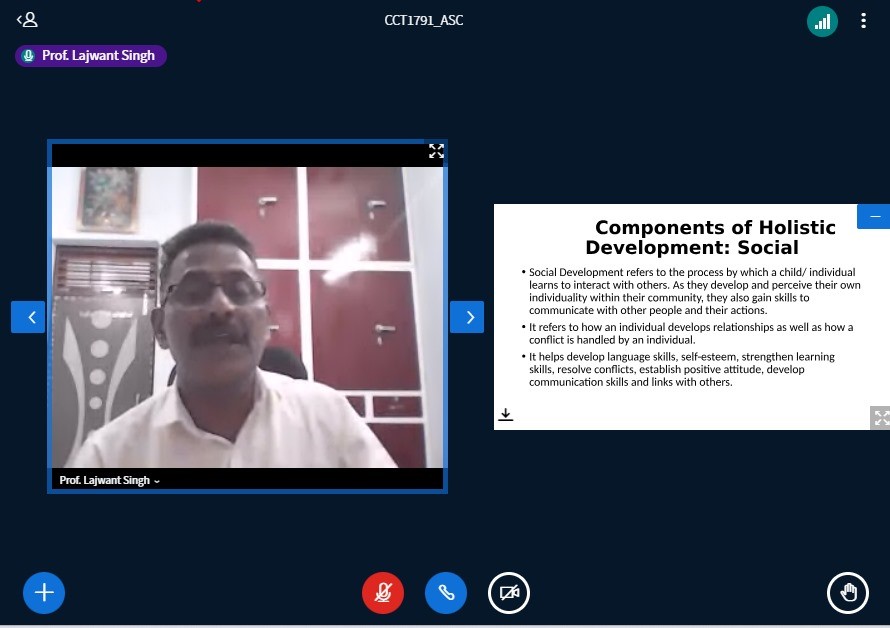
Day 1 – Module 1: Holistic Development of Society: Need for Social Impact Assessment
Participants were immersed in the need for social impact assessment expertly guided by Prof. Lajwant Singh. This module served as an enlightening exploration into various facets of social impact assessment. Prof. Singh elucidated the intricate socio-economic effects stemming from rapid urbanization and industrialization, highlighting the imperative of addressing community well-being and quality of life. Moreover, discussions delved into the crucial aspect of economic equity and social justice, underlining the necessity of comprehensive approaches for sustainable development.
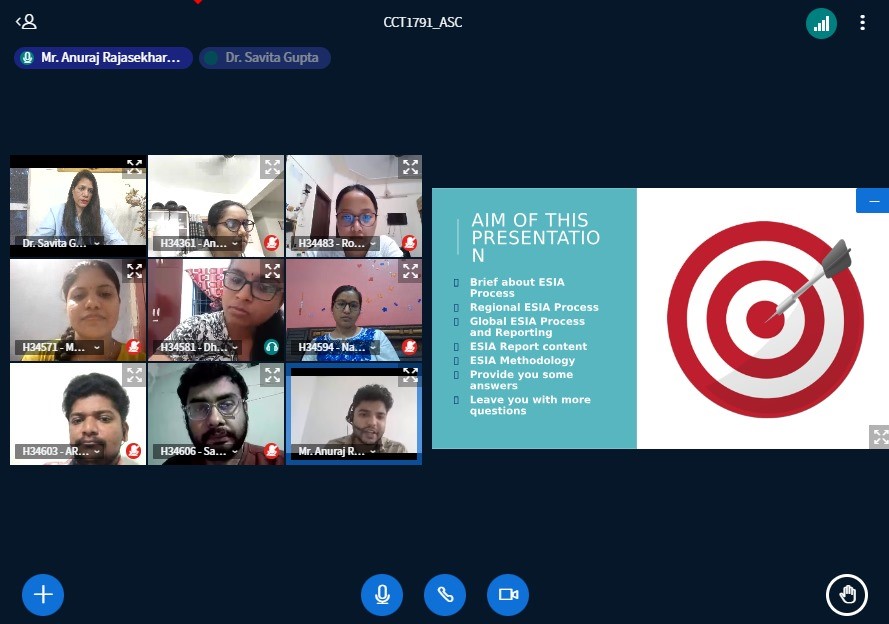
Day 2 – Module 2: Environmental and Social Impact Assessment Guideline
Continuing the intellectual journey Mr. Anuraj Rajasekhara Kaimal assumed the role of guide for module two environmental and social impact assessment guideline. Participants were given a comprehensive overview of the regulatory frameworks, legal obligations and best practices in environmental impact assessment. Mr. Kaimal also focused on the nuanced tools and techniques employed in assessing the environmental ramifications of development projects. Through engaging discussions participants gained insights into the intricate balance between economic progress and environmental management.
Day 3 – Module 3: Adverse Impact of Development Projects on Environment
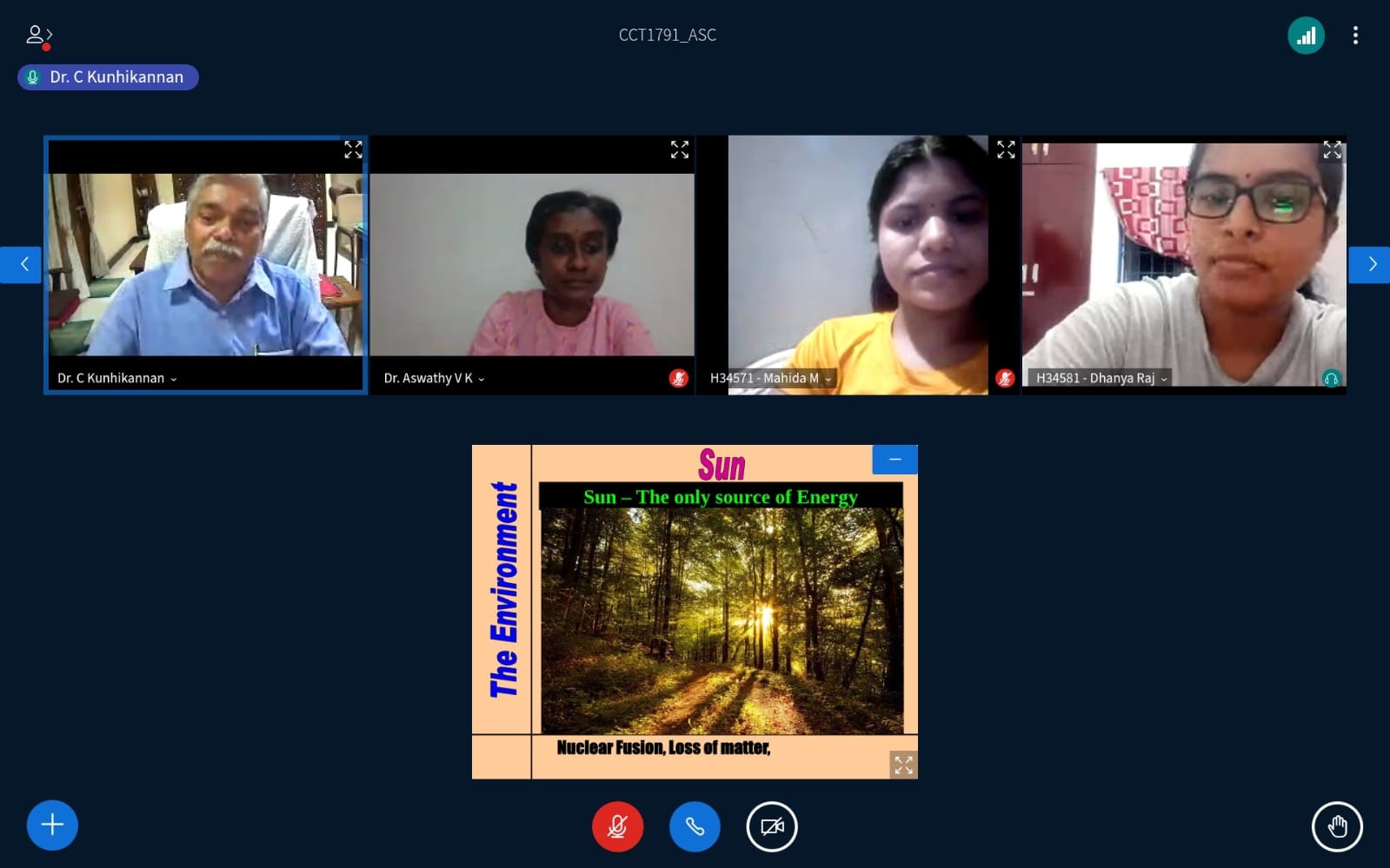
On this pivotal day, module three on the adverse impact of development projects on the environment took center stage, under the expertise of Dr. Kunhikannan, participants embarked on a profound exploration into the adverse consequences of development initiatives on the environment. Dr. Kunhikannan expertly discussed the systematic identification, prediction and mitigation of adverse impacts. Through case studies and real-world examples, participants gained practical insights into fostering sustainable development practices.
Day 4 – Module 4: Environmental Impact Assessment: Forest Development Practitioners’ Perspective
Dr. Kunhikannan resumed his role as a beacon of knowledge, focusing on environmental impact assessment: forest development practitioners’ perspective. This session provided a unique vantage point into the intricacies of impact assessments within forest ecosystems. Dr. Kunhikannan’s expertise highlighted the importance of preserving ecosystem services and biodiversity conservation. Participants were enriched with a deeper understanding of the symbiotic relationship between human development and ecological preservation.
Day 5 – Module 5: Participatory Rural Appraisal (PRA): Tools and Techniques to Assess Socio-Environmental Impact
Prof. Antony Palackal focused on Participatory Rural Appraisal (PRA) tools and techniques to assess socio-environmental impact. This session enriched participants with practical tools and methodologies to gauge the socio-environmental impact of development initiatives. Through interactive exercises and case studies, participants honed their skills in ensuring community engagement and fostering sustainable development practices.
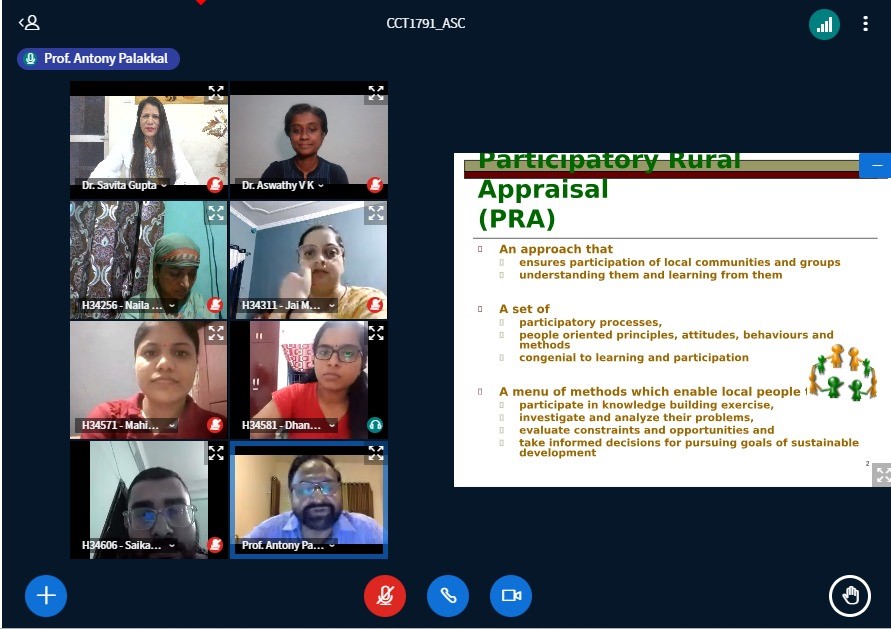
Day 6 – Module 6: Social Impact Assessment and Role of Participatory Rural Appraisal
On 6 day Prof. Lekshmi V Nair conducted a session on Social Impact Assessment and the role of Participatory Rural Appraisal. Discussions centered on the pivotal role of community participation and stakeholder collaboration in social impact assessment processes. Prof. Nair’s insightful guidance highlighted the importance of contextual understanding and community empowerment in fostering sustainable development practices.
Subject Matter Experts (SMEs) strategically incorporated collaborative learning techniques including demonstrations and case-based teaching, fostering an engaging and interactive learning environment. Post-training evaluation serves a crucial role in gauging the efficacy of the STC. Two types of post training evaluation both quiz and project were assigned. Participants were asked to submit a powerpoint presentation on potential socio-economic impacts and mitigation measures associated with a bus terminal development carried out in a village dominated by tribal populations and further instructed to emphasize impacts and mitigation measures and separately mention the construction and operation stages of the development.
Dr. Savita Gupta, Professor, Head-Department of Faculty Development coordinator of the program applauded the resource persons and organizing team for conducting a meaningful short-term course successful in meeting participants’ expectations. Co-coordinator of the program Dr. Aswathy V K, Assistant Professor, Department of Sociology, LPU proposed a formal vote of thanks. Feedback was solicited from the participants in response to which they appreciated the gesture shown by the LPU-HRDC in terms of choice of SMEs and curriculum framed to make us clear about environmental and social impact assessment.




